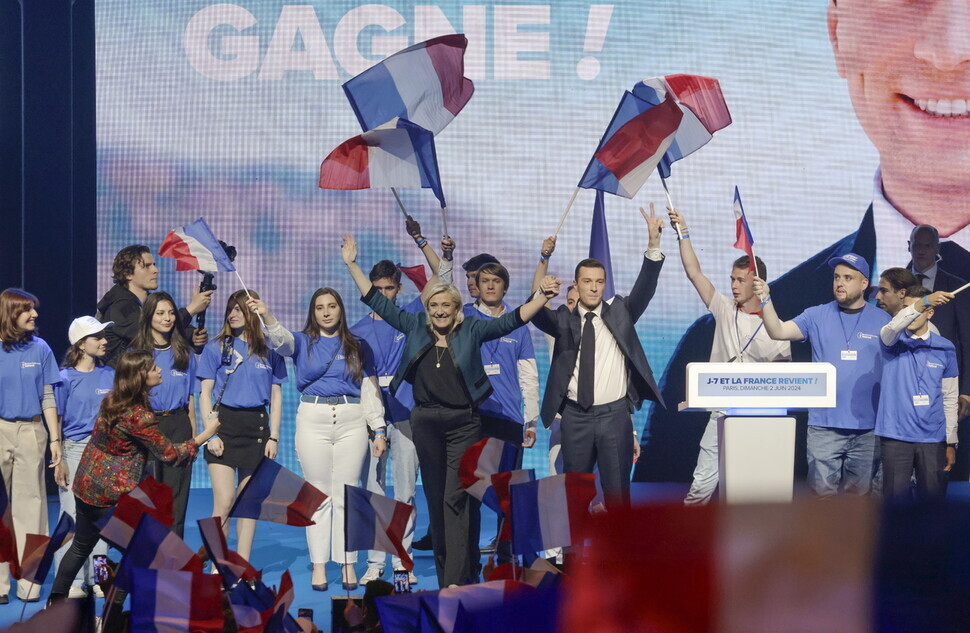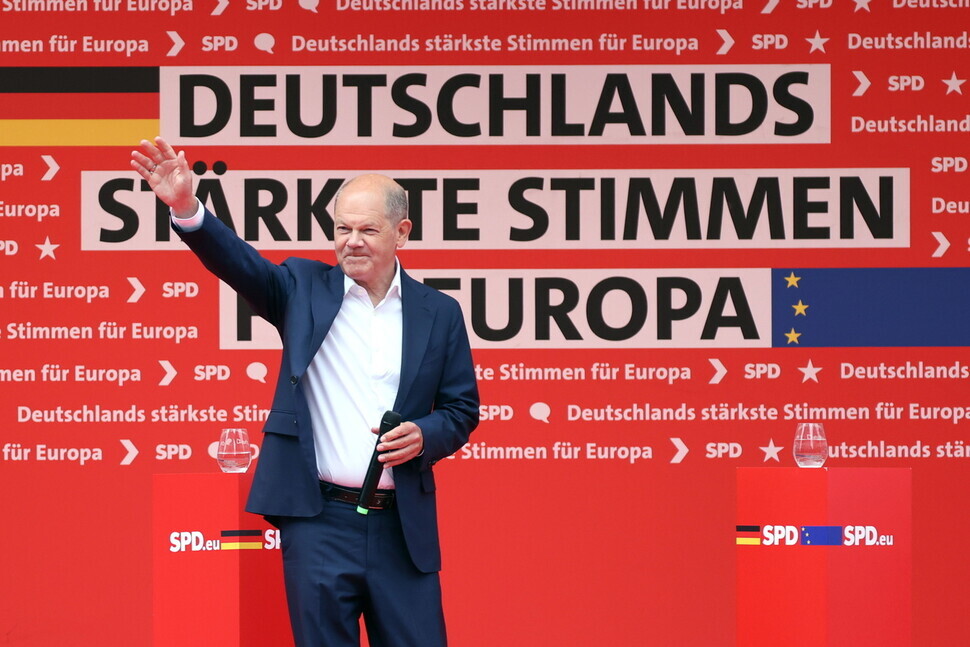hankyoreh
Links to other country sites 다른 나라 사이트 링크
As 373 million EU voters pick new parliament, many anticipate a sharp right turn

Thursday marks the beginning of the European Parliament elections, when 373 million voters cast their votes in 27 EU member countries, ranging from Finland in the far north to Cyprus in the south and from Bulgaria in the east to Ireland in the west.
With far-right parties predicted to make major gains in the large-scale elections — which continue for four days through Sunday — many are voicing concerns about the parliament making a sharp lurch to the right.
The European Parliament’s role
The European Parliament has the authority to review budgets, pacts and legislation. While it does not have the same right to present legislation that its individual members’ parliaments do, it is empowered to review and request revisions to legislation presented by the European Commission, which amounts to the EU’s executive branch.
It also reviews the EU’s budget, which amounts to 189.4 billion euros this year. But since individual member countries hold authority on matters of security and national defense, any related resolutions by the European Parliament are not legally binding.
Another key power of the parliament is the authority to elect the European Commission’s president. Candidates are named at an EU summit, after which the final selection is confirmed through a ratification vote by the parliament. Incumbent Ursula von der Leyen, who is affiliated with the parliament’s largest party — the European People’s Party (EPP) — has declared her intent to run for another term, solidifying her as a candidate for the next presidency.
How will the elections be held?
European Parliament members are directly elected by voters in 27 member countries, with slightly different methods in each one. The parliament has a total of 720 seats, which are allocated in proportion to the country’s population.
Germany currently has the most seats, with 96, followed by France (81) and Italy (76). The countries with the fewest allocated seats are Cyprus, Luxembourg and Malta, with six each.
Once elected, members operate in political groups based on philosophical and political orientation, which function much like traditional political parties. To be recognized, a political group must have at least 25 members from at least seven different countries, or more than one-quarter of all member countries.
The group for the EPP, which accounts for the most European Parliament seats with 176, is center-right in orientation, centering on traditionally right-leaning parties such as Germany’s Christian Democratic Union and France’s Republican Party.
Prominent groups representing the center left include the Progressive Alliance of Socialists and Democrats (S&D, 139 seats) and the liberal-oriented Renew Europe (RE, 102 seats). The European Conservatives and Reformists Group (ECR, 69 seats) and Identity and Democracy Group (ID, 49 seats) are considered far-right.
In addition to serving as a gauge of the EU’s future political direction, the parliamentary elections are also a way for voters to rate member country governments.
“One similarity between South Korea’s local elections and the European Parliament elections is that [voters] tend strongly to cast votes that pass judgment on the administration,” noted Korea National Diplomatic Academy professor Jun Hae-won.
“The European Parliament elections are also used as a platform for expressing views on domestic politics,” she explained.
Intensifying “right turn”
Attention is focusing on how much influence the far-right parties stand to gain in the election. Currently campaigning actively with views opposing immigration and Green Deal policies for achieving carbon neutrality goals, the EU’s far-right parties have taken on a different look from five years prior.
Last week, the political news outlet Politico released findings from an analysis of recent public opinion. It predicted that the total seats won by the far right would surpass those of the currently top-ranked EPP.
Politico also predicted that the EPP would win 170 seats in the election, losing six but retaining its status as the single largest group. The center-left S&D was predicted to increase its number of seats by three to 142, holding onto its status as the second-biggest group.
Meanwhile, ID was predicted to make huge gains by winning 69 seats, or 20 more than its current level. The ECR — one of whose members is Brothers of Italy, the far-right party to which current Italian Prime Minister Giorgia Meloni belongs — was expected to win 75 seats.
Taken together, the predicted seats for these two groups would amount to around 144, surpassing the S&D’s total.
Alternative for Germany, a German far-right party that sparked controversy with an affiliated politician’s remarks defending the Nazi guard, ended up being kicked out of the ID group. But it is currently expected to win 16 seats as part of an independent group.
When independent far-right parties are factored in, the total number of seats won by far-right figures could reach 180. Meanwhile, the Green Party group, which stirred up a wave in the elections five years ago that left it with 72 seats, was predicted to drop to 42 seats this time.
In a report published in January, the European Council on Foreign Relations called the situation a “sharp right turn.”
“[W]e expect that populist voices, particularly on the radical right, are likely to be louder after the 2024 elections than at any point since the European Parliament was first directly elected in 1979,” it wrote.
Far right’s growing weight: Managing coalitions amid severe polarization
The European Parliament’s current system of major coalitions centering on the center right and center left could end up suffering fractures.
The prevailing view among observers is that the top two current groups, the EPP and S&D, will continue acting as a coalition.

But the European Council on Foreign Relations also predicted growing potential for a coalition between center-right and far-right groups. In its report, it suggested that a new populist right-wing coalition may come to replace the left in areas such as immigration issues, the rule of law, and the environment.
“As the European Parliament splits [along left-right lines], the policymaking process will become even more complicated,” explained An Pyeong-eok, a professor of international relations at Daegu University.
“Green Deal policies in particular are something that a lot of farmers have also been protesting, and they will end up having to be slowed down,” he predicted.
Some are expressing concerns over the parliament’s polarization between left and right. One focus will be on the direction that the top-ranked EPP and von der Leyen steer the parliament and commission after the election, when the gap between left and right is expected to grow.
In her bid for reelection, von der Leyen has reached out to Meloni, hinting at the possibility of cooperation with the far right.
Since her chances of re-election will only be secure with the support of over half the parliament’s members, von der Leyen is in the position of having to cooperate with the ECR, to which Meloni belongs.
On May 23, she sent a message signaling the possibility of cooperating with Meloni, declaring that she could be a partner to anyone who supported three conditions: pro-EU, pro-Ukraine, and pro-rule of law.
But in a press conference following his summit the very next day following his Portuguese Prime Minister Luís Montenegro, German Chancellor Olaf Scholz sent a warning message to von der Leyen.
“When the next commission is formed, it must not be based on a majority that also needs the support of the far right,” he cautioned.
By Jang Ye-ji, staff reporter
Please direct questions or comments to [english@hani.co.kr]

Editorial・opinion
![[Column] Is Korean democracy really regressing? [Column] Is Korean democracy really regressing?](https://flexible.img.hani.co.kr/flexible/normal/500/300/imgdb/original/2024/0705/2917201664129137.jpg) [Column] Is Korean democracy really regressing?
[Column] Is Korean democracy really regressing?![[Column] How tragedy pervades weak links in Korean labor [Column] How tragedy pervades weak links in Korean labor](https://flexible.img.hani.co.kr/flexible/normal/500/300/imgdb/original/2024/0703/8717199957128458.jpg) [Column] How tragedy pervades weak links in Korean labor
[Column] How tragedy pervades weak links in Korean labor- [Column] How opposing war became a far-right policy
- [Editorial] Korea needs to adjust diplomatic course in preparation for a Trump comeback
- [Editorial] Silence won’t save Yoon
- [Column] The miscalculations that started the Korean War mustn’t be repeated
- [Correspondent’s column] China-Europe relations tested once more by EV war
- [Correspondent’s column] Who really created the new ‘axis of evil’?
- [Editorial] Exploiting foreign domestic workers won’t solve Korea’s birth rate problem
- [Column] Kim and Putin’s new world order
Most viewed articles
- 110 days of torture: Korean mental patient’s restraints only removed after death
- 2Real-life heroes of “A Taxi Driver” pass away without having reunited
- 3Koreans are getting taller, but half of Korean men are now considered obese
- 4Former bodyguard’s dark tale of marriage to Samsung royalty
- 5On South Pacific island, Korean fishermen again looking to buy sex
- 6Report reveals toxic pollution at numerous USFK bases
- 7Around 2 mil. Koreans conscripted to labor from 1939 to 1945
- 8S. Korea “monitoring developments” after report of secret Chinese police station in Seoul
- 9National Assembly passes bill for special counsel probe into Marine’s death
- 10Study finds that 87% of South Korean households have private health insurance